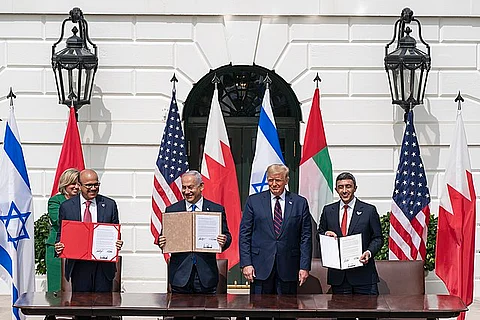

Despite Trump’s public urgency to expand the Abraham Accords, efforts to include Azerbaijan and Central Asian nations like Kazakhstan are largely symbolic. These countries already maintain longstanding diplomatic and military ties with Israel, rendering formal accession functionally redundant. Azerbaijan, for instance, has purchased $3 billion in Israeli arms since 2020 and hosts Israeli intelligence operations targeting Iran. The move appears designed to manufacture diplomatic "wins" while bypassing substantive issues like the Armenia-Azerbaijan conflict, which the U.S. nominally demands as a precondition.
Far from fostering peace, the Accords have become a mechanism for entrenching regional authoritarianism. Signatory regimes like the UAE and Bahrain leverage Israeli surveillance technology to crush dissent, with Emirati authorities imprisoning activists who oppose normalization. Morocco similarly exploits the pact to legitimize its illegal occupation of Western Sahara, trading diplomatic favors with Israel for U.S. recognition of its annexation. This repression extends to public discourse: Saudi Arabia silenced the group "Saudis Against Normalization" through hacking and imprisonment.
The Accords’ core outcome has been a dangerous arms race, enriching U.S. and Israeli defense contractors while destabilizing the region. Israel’s arms exports surged 55% post-Accords, with $3 billion in sales to Arab signatories, including radar systems and drones used against civilian populations. The UAE’s purchase of Israeli Spyder missile systems and Morocco’s acquisition of attack drones exemplify how the pact fuels conflict. Meanwhile, the U.S. accelerated this trend by approving F-35 sales to the UAE and F-16s to Bahrain; deals previously blocked over human rights concerns.
Trump’s expansion push explicitly sidelines Palestinian self-determination, rewarding Israel’s intensified occupation. Since the Accords’ signing, Israeli settlement construction in the West Bank has accelerated, settler violence has surged, and Gaza’s humanitarian crisis has reached genocidal levels with over 60,000 Palestinian deaths reported. Arab signatories, prioritizing access to U.S. weapons and technology, have abandoned the Arab Peace Initiative’s core demand: Palestinian statehood in exchange for normalization. As one analyst notes, the Accords treat Palestine as a “checkbox” rather than a moral imperative.
The Accords have demonstrably failed to achieve their stated geopolitical goals, such as "Iranian Containment". Gulf states rapidly restored ties with Tehran after the 2023 Saudi-Iran deal brokered by China. The UAE remains Iran’s top trading partner, undermining the "anti-Iran alliance" narrative. Regional Stability remains elusive with conflicts in Yemen, Syria, and Lebanon persisting, while Israel’s 2023–2025 wars with Hamas and Hezbollah expose the Accords’ irrelevance to security. Gulf states deepened ties with China, hosting joint military exercises and technology partnerships, while Russia retains its Syrian bases., showing the Accords having failed in extending US influence.
As Canada, France, and the UK move to recognize Palestine, the Accords stand exposed as a mechanism for legitimizing apartheid. The pact’s architects, Trump, Netanyahu, and Arab autocrats ignore that sustainable peace requires justice, not arms deals. With 95% of Gazans facing starvation and hospitals bombed, the Accords’ legacy is one of complicity in atrocity.